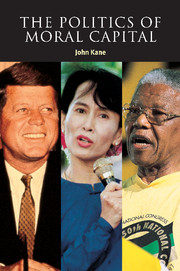Book contents
10 - Denouement
Published online by Cambridge University Press: 22 September 2009
Summary
The truth is rarely pure, and never simple.
Oscar Wilde, The Importance of Being EarnestReagan's popularity was such that George Bush, a man of small political profile and experience, had little choice but to run on the promise of continuity with the great communicator (though upon election he proceeded, as steadily as he could, to distance himself from his predecessor). The dominant public sentiment in 1988 seemed no longer one of injured national pride, but fear of recession and unemployment, and in the end it would be Bush's perceived inability to handle the economy that would cost him a second term. Continuity meant, for Bush, reaping some of the economic problems sewn but not ripened in the Reagan years, the budget deficit in particular. A Democrat-dominated Congress did not ease his task, and he was saddled with his own campaign promise of “no new taxes.” Continuity also meant that Bush's own central commitments remained something of a mystery. Earnest and hard-working rather than inspiring, he seemed to have no clearly articulated moral purpose, no vision of America, to which to harness his undoubted political ambition and, consequently, he was often accused of “wimpish” indecisiveness.
This was part of the reason that Bush's apparently brilliant foreign policy successes failed to translate into votes at home. The larger story was that the Bush presidency marked the definite end of the era that had produced America's moral crisis.
- Type
- Chapter
- Information
- The Politics of Moral Capital , pp. 235 - 254Publisher: Cambridge University PressPrint publication year: 2001

